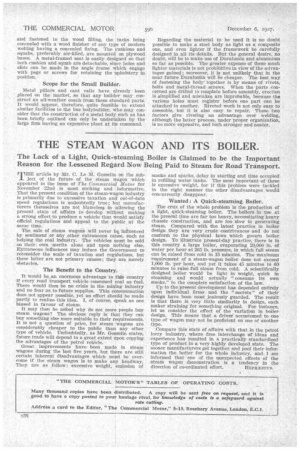THE STEAM WAGON AND ITS BOILER.
Page 64

If you've noticed an error in this article please click here to report it so we can fix it.
The Lack of a Light, Quick-steaming Boiler is Claimed to be the Important Reason for the Lessened Regard Now Being Paid to Steam for Road Transport.
THE article by Mr. C. Le M. Gosselin on the Subject of the future of the steam wagon which appeared in the issue of The Commercial Motor for November 22nd is most striking and informative. That the present condition of the steam-wagon industry is primarily due to excessive taxation and out-of-date speed regulations is undoubtedly true; but manufacturers themselves are not blameless in allowing the present state of affairs to develop without making a strong effort to produce a vehicle that would satisfy official regulations and appeal to the public at the same time,
The sale of steam wagons will never be influenced by sentiment or any other extraneous cause, such as helping the coal industry. The vehicles must be sold on their, own merits alone and upon nothing else. Extraneous influences may induce the Government to reconsider the scale of taxation and regulations, but these latter are not primary causes; they are merely obstacles.
The Benefit to the Country.
It would be,an enormous advantage to this country if every road transport vehicle consumed coal as fuel. There would then be no crisis in the mining industry and no fear as to future supplies. This consummation does not appear possible, yet an effort should be made partly to realize this idea. I, of course, speak as one biased in favour of steam.
It may then be asked why do not more people buy steam wagons? The obvious reply is that they can buy something else more suitable to their requirements. It is not a question of price, for steam wagons are considerably cheaper to the public than any other type of vehicle. Undoubtedly, as Mr. Gosselin states, future trade will depend to a great extent upon copying the advantages of the petrol vehicle.
Great improvements have been made in steam wagons during the last five years, but there are still certain inherent disadvantages which must be overcome if the steam wagon is to make any headway. They are as follow : excessive weight, emission of smoke and sparks, delay in starting and time occupied in refilling water tanks. The most important of these is excessive weight, for if this problem were tackled in the right manner the other disadvantages would concurrently disappear.
Wanted : A Quick-steaming Boiler.
The crux of the whole problem is the production of a light, quick-steaming boiler. The boilers in use at the present time are far too heavy, necessitating heavy chassis construction, and are too slow in generating steam. Compared with the latest practice in boiler design they are very crude contrivances and do not conform to the physical laws which govern boiler design. To illustrate present-day practice, there is in this country a large boiler, evaporating 20,000 lb. Of water per hour at 265 lb. pressure, in which full steam can be raised from cold in 15 minutes. The maximum requirement of a steam-wagon boiler does not exceed 1,000 lb. per hour, and yet it takes 45 minutes to 60 minutes to raise full steam from cold. A scientifically designed boiler would be light in weight, quick in steaming and would actually "consume its own smoke," to the complete satisfaction of the law.
Up to the present development has depended entirely upon individual firms and the "secrets" of their design have been most jealously guarded. The result is that there is very little similarity in design, each maker straining for something original. For instance, let us consider the effect of the variation in boiler design. This means that a driver accustomed to one type of wagon may not be proficient on one of another type.
Compare this state of affairs with that in the petrol lorry industry, where free interchange of ideas and experience has resulted in a practically standardized type of product in a very highly developed state. The sooner manufacturers get together and pool their information the better for the whole industry, and I am informed that one of the unexpected effects of the steam wagon demonstration is a tendency in the direction of co-ordinated effort. HEPRESTUS.




















































































































